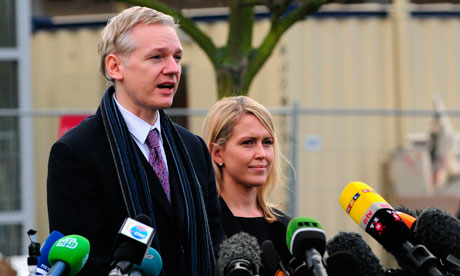Julian Assange to learn extradition decision
WikiLeaks founder will hear court's response to arguments relating to European arrest warrant issued by Sweden
- guardian.co.uk,
- Article history

Julian Assange outside an extradition hearing at Belmarsh magistrates court with one of his legal team. Photograph: KeystoneUSA-ZUMA/Rex Features
The WikiLeaks founder Julian Assange is preparing to find out whether Sweden has been successful in its attempt to extradite him in relation to allegations of rape and sexual assault.
Assange has consistently denied the accusations, made by two women in August last year, and has been fighting extradition since he was arrested and bailed in December. The decision will be handed down on Thursday.
At a two-day hearing earlier this month, his legal team argued that the European arrest warrant (EAW) issued by Sweden was invalid since the Australian has not been charged with any offence, that the alleged assaults would not be legitimate extraditable offences, and that he would not receive a fair trial in Sweden.
Howard Riddle, the chief magistrate, will deliver his ruling on those arguments at a hearing in London.
The Swedish prosecutor, represented in court by the British Crown Prosecution Service, has maintained throughout that despite the lack of charge, Assange is being sought for prosecution rather than merely for questioning, which it argues means the warrant is valid.
The most serious of the four allegations relates to an accusation that Assange, during a visit to Stockholm in August, had sex with a woman, Miss B, while she was sleeping and without a condom, against her consent. Three counts of sexual assault are also alleged against another woman, Miss A. If found guilty of the rape charge he could face up to four years in prison.
Since there is no system of bail in Sweden, he would be detained in custody if extradited until a possible trial or release.
Riddle has already remarked on "the possibility, perhaps the inevitability" of an appeal against his decision, whichever way he leans, which would delay a final decision on the Australian's fate for some months.
A senior extradition barrister said this week Riddle was "very likely" to rule against Assange. The Australian ambassador to Sweden, Paul Stephens, wrote to the country's justice minister last week to insist that, if extradited, any possible case against Assange "would proceed in accordance with due process and the provisions prescribed under Swedish law, as well as applicable European and international laws, including relevant human rights norms".
Assange also fears that if sent to Sweden it would make more likely an onward extradition to the United States on possible charges relating to WikiLeaks's release of leaked US embassy cables.
In such an event, Sweden would be required to ask permission from the UK for the onward extradition. No such charges have been laid, though the website's activities are under investigation in the US.
EAWs were introduced in 2003 with the aim of making extradition swifter and easier between European member states. But campaigners have raised concerns about the application of the controversial warrants, arguing that they are sometimes applied before a case is ready to prosecute, and that while they were originally intended to counter terrorism, their use has greatly increased: 700 people were extradited from the UK under the system last year.

No comments:
Post a Comment